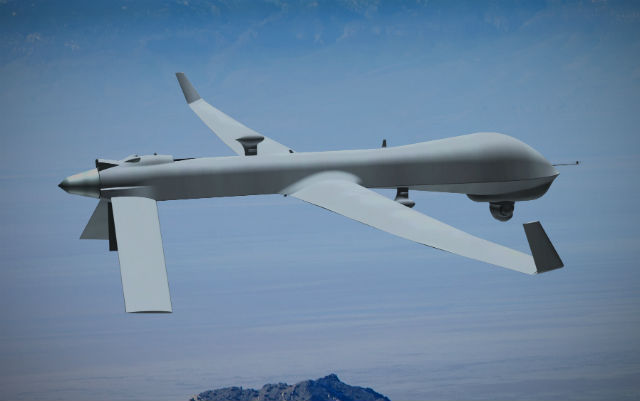 General Atomics Aeronautical Systems, Inc. announced the successful first flight of Predator XP, an updated version of the company’s flagship Predator RPA that has been licensed by the U.S. Government for sale to a broader customer base, including countries in the Middle East, North Africa, South America, and Asia. The flight occurred June 27 at Castle Dome Airfield, located at the U.S. Army’s Yuma Proving Ground Range Complex in Arizona.
General Atomics Aeronautical Systems, Inc. announced the successful first flight of Predator XP, an updated version of the company’s flagship Predator RPA that has been licensed by the U.S. Government for sale to a broader customer base, including countries in the Middle East, North Africa, South America, and Asia. The flight occurred June 27 at Castle Dome Airfield, located at the U.S. Army’s Yuma Proving Ground Range Complex in Arizona.
“This first flight represents a major milestone for GA-ASI’s newest product line designed and developed for our international allies worldwide,” said Frank W. Pace, President, Aircraft Systems, GA-ASI. “We are now positioned to restart the Predator production line and proceed directly to full production in anticipation of new customer orders.”
During the company-funded 35-minute flight, Predator XP demonstrated its ability to launch, climb to operational altitude, complete basic airworthiness maneuvers, and land without any discrepancies. A subsequent test programme will be conducted to verify Predator XP’s design, including safety of flight, automatic takeoff and landing, payload and communications testing, as well as beyond line-of-sight satellite communications control.Managed by the U.S. Army Yuma Proving Grounds, Castle Dome Airfield was developed to support RPA flight test operations. The airfield originally was built in the 1960s as a heliport for the Apache development program, and in 1980 a runway was added to support fixed wing operations. The runway was extended in 2003 and then updated again earlier this year to house a GA-ASI facility dedicated to the development and test of the company’s RPA, including Predator XP. The facility likewise will be used for showcasing the Predator XP system to international customers.Offering improved Intelligence, Surveillance, and Reconnaissance (ISR) capabilities, Predator XP exhibits the same physical dimensions, altitude, speed, and long endurance (up to 35 hours) as the proven “RQ-1” Predator A aircraft. The aircraft also has been updated to include triple-redundant avionics, an Automatic Takeoff and Landing System (ATLS), GA-ASI’s Lynx Multi-mode Radar with Maritime Wide Area Surveillance (MWAS), High-Definition Electro-optical video, an improved Claw sensor control and image analysis software system, an Automatic Identification System (AIS) for maritime vessel monitoring and tracking, and a more efficient propulsion system.
Source: Press Release
